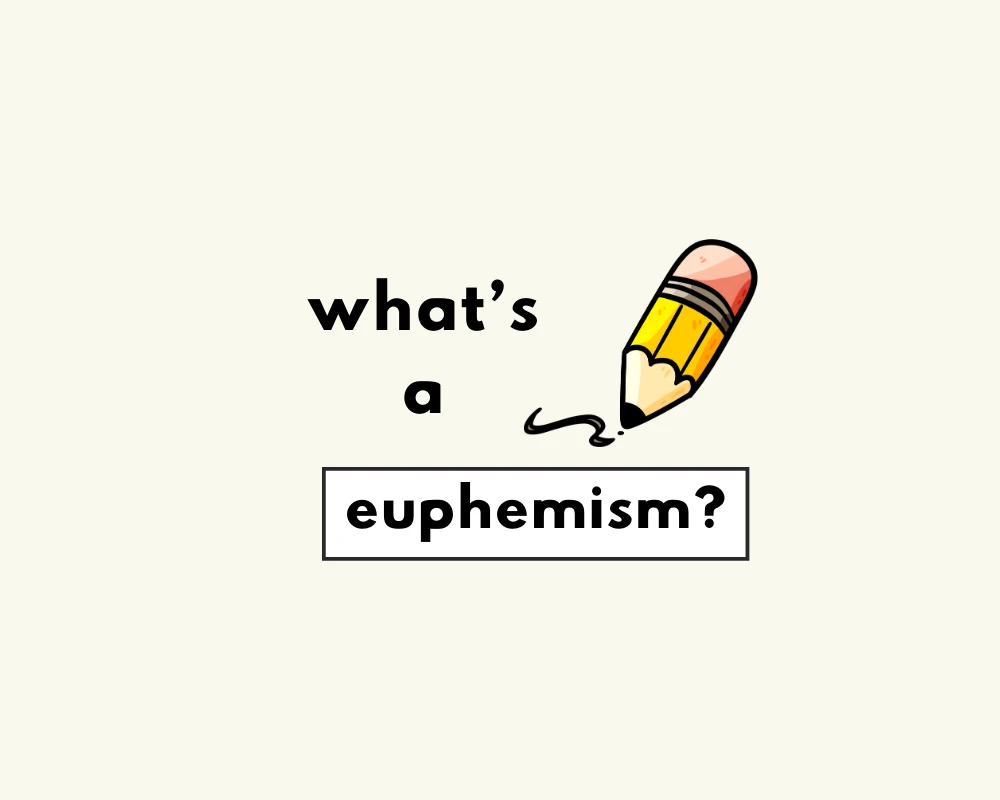What’s a euphemism?
She has gone to the restroom.
They had eaten dinner before the movie.
He has went home.
We have saw the sunset.
Have you ever heard people use phrases like let go, when they mean that someone got fired (from their job)?
To use the phrase spin the truth instead of lie, or describe someone as “vertically challenged” as opposed to short—each of these words and phrases is a literary technique, which we call a euphemism (pronounced you-fuh-mism).
For a formal definition: [euphemisms] are a literary technique which uses “an innocuous word or expression in place of one that is deemed offensive or suggests something unpleasant”.
Essentially, a less harsh way of saying something.
Dictionary definitions of euphemisms
Collins Dictionary defines it as: “a polite word or expression … to refer to things which people may find upsetting or embarrassing to talk about, for example sex, the human body, or death”.
Merriam-Webster on euphemism: “the substitution of an agreeable or inoffensive expression for one that may offend or suggest something unpleasant”.
Oxford Learner’s Dictionary: “An indirect word or phrase that people often use to refer to something embarrassing or unpleasant, sometimes to make it seem more acceptable than it really is . . . ‘downsizing’ as a euphemism for cuts”.
Synonyms for euphemism
- mild alternative
- polite term
- understatement
- substitute
- genteenlism
- underplaying
- indirect term
‘euphemism,’ associate the ‘eu-‘ prefix (meaning ‘good’ or ‘well’) with using “good speech” to make something unpleasant sound gentler.
Origin of the word euphemism
1650s, from Greek euphemismos “use of a favorable word in place of an inauspicious one, superstitious avoidance of words of ill-omen during religious ceremonies,” also of substitutions such as Eumenides for the Furies. This is from euphemizein “speak with fair words, use words of good omen”.
Common examples of euphemisms
- “Let go” instead of “fired”
- “Bit the dust” instead of “died”
- “Big boned” instead of “fat”
- “Darn” instead of “damn”
- “Spin the truth” instead of “lie”
- “Unique looking” instead of “ugly”
- “Stepping out” instead of “cheating”
Sentences with the word “euphemism”
My business with them is to take them out individually on little visits (my euphemism) for two or three weeks to various flocks of ewes.
—The New Yorker, 4 Dec. 2023
The various other panelists took refuge in euphemism.
—Joel Khalili, WIRED, 30 Oct. 2023
Not officially, of course; at this stage, the fact that Hayes will be the next coach of the U.S. women’s team is merely an open secret, a fait accompli that must—for now—remain swaddled by a warm blanket of euphemism.
—Rory Smith, New York Times, 10 Nov. 2023
Read about other literary devices
- What’s Alliteration?
- What is Irony?
- What is Verbal Irony?
- What is Dramatic Irony?
- What’s Situational Irony?
- What’s a Hyperbole?
Work Sheet
According to the post, what is a euphemism?
What is the typical purpose of using a euphemism?
Which common example from the post is a euphemism for ‘fired’?
Based on the origin discussed, the prefix “eu-” in euphemism relates to what meaning?
Which of these is listed as a synonym for euphemism in the post?
Using the phrase “spin the truth” instead of “lie” is an example of a .
Euphemisms are often used to refer to things that people find upsetting or to talk about, such as death or the human body.
The common example phrase “bit the dust” is used as a euphemism for .
Oxford Learner’s Dictionary notes that euphemisms sometimes make something unpleasant seem more than it really is.
A euphemism is defined as using a less way of saying something unpleasant.
Frequently Asked Questions
What is a euphemism?
+
Why use euphemisms?
+
What is the origin of euphemism?
+
Give some examples of euphemisms.
+
What are synonyms for euphemism?
+
Yash, D. "What’s a Euphemism? (Meaning & Examples)." Grammarflex, Jun 21, 2025, https://www.grammarflex.com/whats-a-euphemism-meaning-examples/.
Sources
-
Harper, Douglas. “Etymology of euphemism.” Online Etymology Dictionary, Accessed 20 February 2024.











